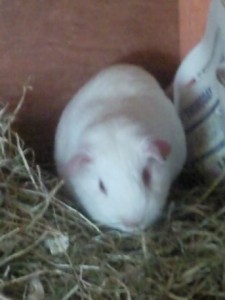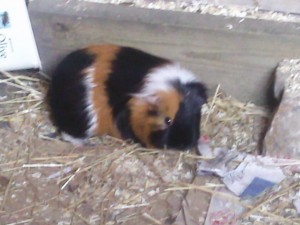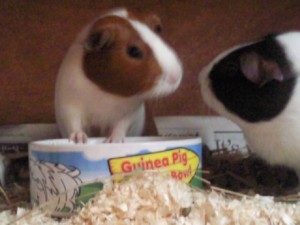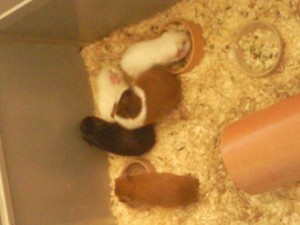Guinea Pigs As Pets
 Are you looking for a new pet for yourself? Why not get a guinea pig? Guinea pigs are fantastic little creatures and make great pets for people of all ages provided they are looked after correctly. Cavies, as they are also called, are often thought of as great ‘first-pets’ for children. This is true but an adult should always be responsible for any animal’s welfare.
Are you looking for a new pet for yourself? Why not get a guinea pig? Guinea pigs are fantastic little creatures and make great pets for people of all ages provided they are looked after correctly. Cavies, as they are also called, are often thought of as great ‘first-pets’ for children. This is true but an adult should always be responsible for any animal’s welfare.
Guinea pigs are a long term commitment and can live for up to 10 years in captivity provided they have been cared for to high standards. They are amazing creatures, each with their own personalities. Just as you get inquisitive or ‘nosy’ people, you can get inquisitive guinea pigs too!
In general guinea pigs are very calm and relaxed animals that love to play. Lots of people think that guinea pigs make better pets than rabbits as they are less territorial and guinea pigs won’t spray you like some male rabbits sometimes do. There are also less health problems associated with guinea pigs than rabbits. Most cavies will also sit on your lap for hours being cuddled without getting bored – something that’s not likely with a rabbit.
I hate to say it but one thing that makes guinea pigs an attractive choice for pets is that they are cheap to buy. Yes, they can be bought from a garden centre or pet shop for around £10, but if this is why you want one then please don’t buy one – you’d be better off with a giant African land snail as they are a lot cheaper to keep in the long run and are fascinating creatures (but they still need the right care). If you keep guinea pigs you’ll have to buy food each month for them, a strong hutch or cage and an exercise run or pen. And then on top of that are any vet fees. If you’re thinking of getting a guinea pig you should get one because you’re interested in the animal.
 Pets are a great way to teach your children about responsibility. One reason why guinea pigs are such popular pets is that they are easy to look after; this is one advantage for the guinea pig being a child’s first pet – there isn’t that much work involved with looking after a guinea pig, unlike a German Shepherd. But don’t be fooled! Guinea pigs still have needs that need to be regularly catered to.
Pets are a great way to teach your children about responsibility. One reason why guinea pigs are such popular pets is that they are easy to look after; this is one advantage for the guinea pig being a child’s first pet – there isn’t that much work involved with looking after a guinea pig, unlike a German Shepherd. But don’t be fooled! Guinea pigs still have needs that need to be regularly catered to.
If the guinea pig is for a child, an adult must be prepared to financially and physically look after the animal if the child looses interest. If a child is looking after the piggy, you may need to remind them at first as this may be the first responsibility they have ever had.
Guinea pigs are such lovable creatures, but to care for them properly and make sure they are happy you will need to carry out regular care routines for your piggy everyday. This includes, feeding, giving fresh water, grooming, playing with your pet and checking the guinea pig is well (with no cuts e.t.c). Your guinea pig’s hutch or cage will need cleaning out at least once a week.
So, if you are going to get a new guinea pig you’ll need to get a suitable home. Many owners who have indoor piggies keep their cavies in cages. If your guinea pig is outside he or she will need a good, strong, sturdy hutch. The hutch should be waterproof and have roofing felt on the roof. The hutch wants to be situated out of the prevailing wind and at an angle so as less rain goes in as possible. I would suggest that the hutch goes in a building of some sort, i.e a shed, as this eliminates risks posed by foxes and other predators.
 Guinea pigs will eat a variety of fruit and vegetables: Cucumber, carrots, cabbage, courgettes e.t.c. (please note: lettuce can sometimes cause diarrhoe). A piggy should also be given a dried food of some sort that is especially made for guinea pigs. Guinea pigs are the only rodents that can’t make vitamin C themselves form the sunlight do it is essential that their food is high in vitamin C to prevent them from getting scurvy. For this reason don’t feed them rabbit food as it doesn’t have enough vitamin C. Always check your guinea pig’s food contains this essential vitamin. Cavies will also need hay and grass to eat. In the wild they’d be grazing most of the time so it is important that this is always available for them as it provides a source of fibre. Similarly fresh water should also be available.
Guinea pigs will eat a variety of fruit and vegetables: Cucumber, carrots, cabbage, courgettes e.t.c. (please note: lettuce can sometimes cause diarrhoe). A piggy should also be given a dried food of some sort that is especially made for guinea pigs. Guinea pigs are the only rodents that can’t make vitamin C themselves form the sunlight do it is essential that their food is high in vitamin C to prevent them from getting scurvy. For this reason don’t feed them rabbit food as it doesn’t have enough vitamin C. Always check your guinea pig’s food contains this essential vitamin. Cavies will also need hay and grass to eat. In the wild they’d be grazing most of the time so it is important that this is always available for them as it provides a source of fibre. Similarly fresh water should also be available.
Your guinea pig will also need an exercise pen of some sort. If it is outside this is ideal as they can eat grass at the same time.
There are many different breeds of guinea pig so choose carefully. Note: long haired guinea pigs require more grooming than short haired breeds.
 Guinea pigs can be found in the wild in South America. They live in herds and are social animals. Therefor you should keep them in twos or threes so they have companions. This will stop them getting bored when you are out. You could also buy some toys for them to play with. My 5 guinea pigs love playing together with ‘bell balls’ and running through cardboard tubes.
Guinea pigs can be found in the wild in South America. They live in herds and are social animals. Therefor you should keep them in twos or threes so they have companions. This will stop them getting bored when you are out. You could also buy some toys for them to play with. My 5 guinea pigs love playing together with ‘bell balls’ and running through cardboard tubes.
So to sum up, if you’re thinking about getting a guinea pig remember they are a long term commitment; guinea pigs can live up to 10 years so consider the decision properly – remember you’ll be in charge of this little life! They have needs that need to be seen to everyday, and should be fed the right food. You’ll need somewhere they can run around. They should be kept in pairs or bigger groups as they are naturally social animals. If a child is looking after the cavy, a responsible adult should check that the guinea pig is being looked after correctly.
Happy guinea pig keeping!
 August 3, 2010
·
August 3, 2010
·  Maddia (Admin) ·
Maddia (Admin) ·  Comments Closed
Comments Closed
 Tags: guinea pigs, guinea pigs as pets, pet guinea pigs · Posted in: Guinea Pig Care, Guinea Pig Information
Tags: guinea pigs, guinea pigs as pets, pet guinea pigs · Posted in: Guinea Pig Care, Guinea Pig Information


